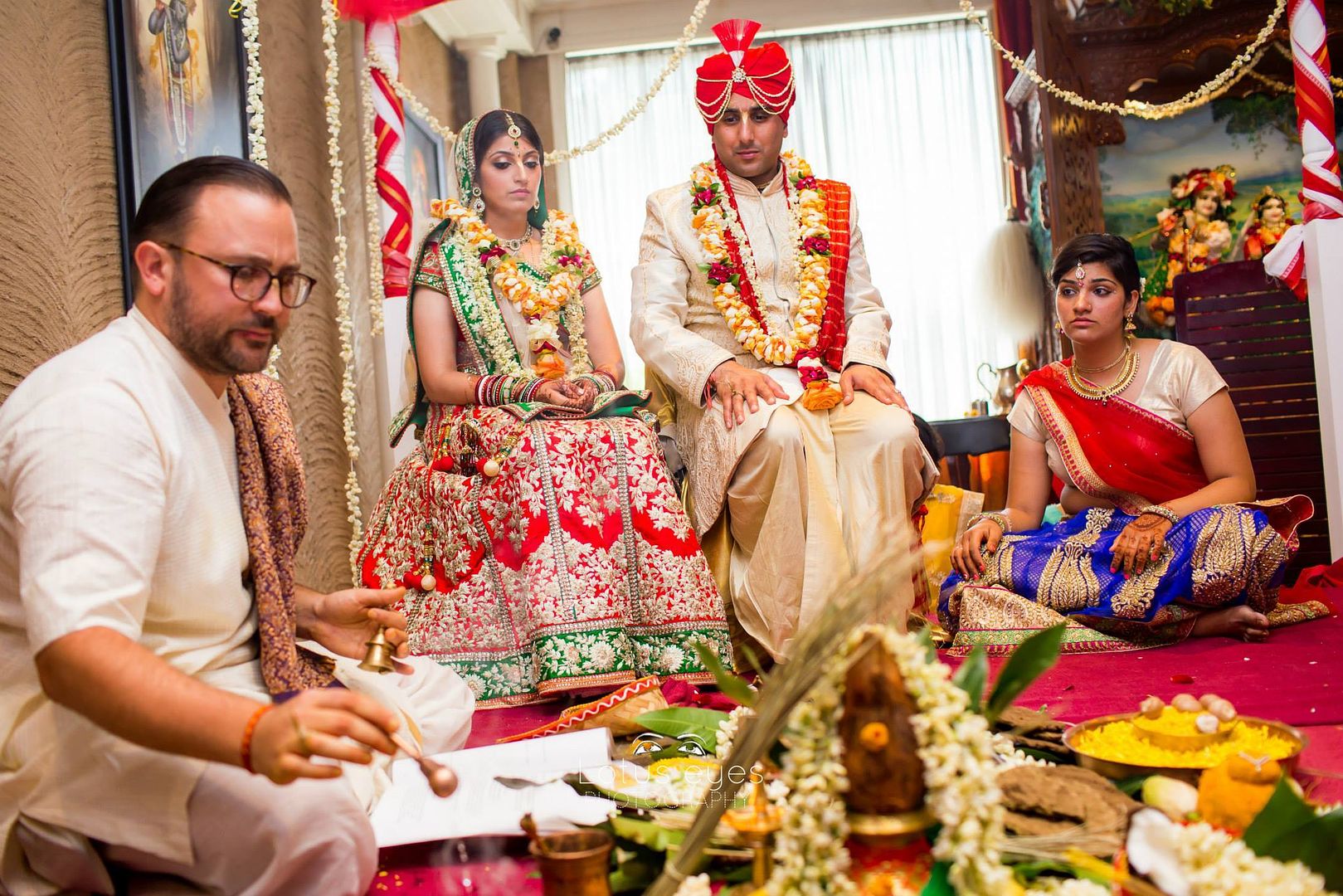(this blog is recorded on the full blog page: quick time player is needed; works best with Firefox or Explorer; if you are using Google Chrome it will automatically play, so if you don't want to listen, mute your speakers.)

(picture from http://lotuseyesphotography.com/)
As an introduction to the Seven Marital tips, I would like to suggest the essential concept of the “trinad api marriage” (which my wife and I are teaching in the 3rd Annual Couple’s Retreat in October in Gita-nagari PA as part of the Grihastha Vision Team effort.) This is a relationship based on mutual humility, tolerance, and respect and is the spiritual basis for a successful marriage. All the other marriage tips that follow can be seen to revolve around this verse spoken by Shri Chaitanya Mahaprabhu. “One who thinks himself lower than the grass, who is more tolerant than a tree, and who does not expect personal honor but is always prepared to give all respect to others can very easily always chant the holy name of the Lord [or remain in a happy, spiritually vibrant, marriage throughout their lives.]
All devotees are recommended to wear this verse around their neck. In a similar way my wife and I recommend that all married couples wear this verse around their necks and think of how to apply it in their marriage, in their life, and in devotional activities. In a marriage we honor and respect one another as devotees (or as souls) and do our best to see to the ultimate welfare of our spouse and family according to their nature. Love and trust, given not only by Shrila Prabhupada but by many marriage authorities, are important qualities for long lasting, fulfilling, relationships. For this discussion, I would add that love and trust come from each person practicing the qualities of humility, tolerance, and respect. These qualities give life to our spiritual practices and marriage. Please keep this in mind as you hear the following simple, though profound, marital tips.
Tip 1: Be committed to personal growth work and the inner vision it fosters in order to become the best person you can. In the process of self-study, understand your life issues and how they can trigger reactionary conflicts in your relationships. Learn to be introspective and observe yourself, understanding both your attractions and repulsions. If you have negative emotional reactions toward certain persons, ask yourself why, and find help if required. Be open to discovering and letting go of those parts of your conditioning that are unfavorable for having happy, healthy, relationships. In short, “Know thyself,” (the age old recommendation) or your strengths and weaknesses, and strive to improve. We are always students of ourselves and on our spiritual journey. We have found studying the Enneagram a very helpful tool in both understanding ourselves and in others.
Tip 2: As far as possible know your spouse’s nature with appreciation. Find their essential goodness and believe in and foster this. Spiritual life is not about staying the same but changing for the better; marriage can greatly facilitate this. How? One of the unglorified purposes of marriage is that your spouse is like a mirror who reveals your own faults and shortcomings. Thus conflicts or disagreements, which actually reveal your personal “issues,” can be welcomed as they are important feedback about the individual and couple’s work that is required. It takes “two to tango,” and two to tangle, so the more you know about yourself and your spouse, and are actively working on the issues between you, the better the “dance” of your relationship. Marriage is an incredible opportunity to grow as persons and to create a space that brings out the best in both persons and in the children that may come.
Tip 3: To be good or successful at anything requires study and flexibility in application. Thus, make it a priority to study about healthy and unhealthy, stressful and joyful, relationships, and discover what you can do to change for the better as individuals and in the relationship. (Change could actually be discovering who you really are, physically speaking, and acting accordingly.) There are many good books on the market which can be quite helpful. Be in the mood of the swan and take the essential while leaving the rest. Additionally, find long-standing happy couples with good spiritual practices and ask them what their secrets of marriage are. Every person and every couple can be teachers for us, either as good or bad examples. Keeping a beginner’s mind, or being open to learn more about yourself and how to improve your relationships, is a very good attitude to cultivate and pray for.
Tip 4: An important point in today’s marriages is to understand that the classical natures of men and women, which are often described in scriptures and touted by some as “the standard,” are often mixed up or different from other times. Men may some have female qualities and women, men’s. This is our practical experience and calls for adjustments in details. Social roles are details and not principles in spiritual life. Additionally, when both persons are breadwinners, this also changes what is “women’s work” or “men’s work.” Thus traditional roles have to be adjusted in terms of the particular natures and work of the individuals, rather than trying to force stereotypes (think hybrid). The basic guiding principle should be to do whatever works to support each individual and the relationship for the long haul in the context of spiritual advancement. Both husband and wife can serve one another, honoring their spouse as a devotee. Humility begins at home.
Tip 5: While spiritual practice and sharing Krishna conscious together are two of the most important purposes of a marriage, if we actually look deeply into what marriage is about, we will find that in addition to the common understanding that marriage provides companionship and mutual support, marriage also helps us learn to selflessly sacrifice for others, and to be charitable—both of which purify our tendency to be an exploiter and think we are the center. Some might argue that this tip should have been the first, yet without the previous four, one will find it difficult to remain married, and especially happily married, for the long haul in the safe shelter that marriage can provide.
Tip 6: A fascinating point, very useful in long term marriages is that your relationship with your spouse has an existence of its own—independent of either person—and thus it needs to be nurtured, as much as you both have to take care of yourself and one another. The relationship has elements of both persons in it, and yet it is distinct, and needs “care and feeding.” Marital problems can be seen as coming from the neglect of this “us-ness” or what you are together—the relationship. So it isn’t that the two of you become one as much as that together you become, or create, a third entity called the relationship. The relationship is maintained and nourished by the mutual care you give it, as enriched by the love and trust between you.
You remain individuals yet you also have synergy between you through the relationship and are more together than you would be by yourself. Power struggles and competition mean you are neglecting the relationship and trying to define yourself separately at the cost of your spouse and the relationship. You are a team for serving one another and others in the framework of spiritual practice. Lastly, I should add, that chanting japa or engaging in other spiritual practices and devotional activities together is good for the relationship, and in remembering that both persons are devotees, whereas just “hanging out,” often isn’t.
Bonus Tip 7: “Marriage is not supposed to make you happy. It’s supposed to make you married; and once you are safely and totally married, you have a structure of security and support from which you can find your own happiness.” [From Frank Pittman’s book, “Grow Up! How Taking Responsibility Can Make You a Happy Adult”] This quote gives us very wise advice but goes against much of our material conditioning that people and things can bring us happiness. Lasting happiness and fulfillment are an inside job and are largely the result of our positive attitude and self-talk, healthy self-esteem (often the result of personal growth work and deep introspection), and a sense of personal mission in the context of the satisfaction and peace that spiritual practice and goals afford us.
*Some adjustments have to made in mixed marriages where only one person is an acknowledged or practicing devotee of Krishna.
Here is a link for our Couple's Retreat this coming October help at the Gita-nagari yoga farm in Pennsylvania an hour West of Harrisburg:
http://vaisnavafamilyresources.org/event/3rd-annual-gita-nagari-couples-...




Comments